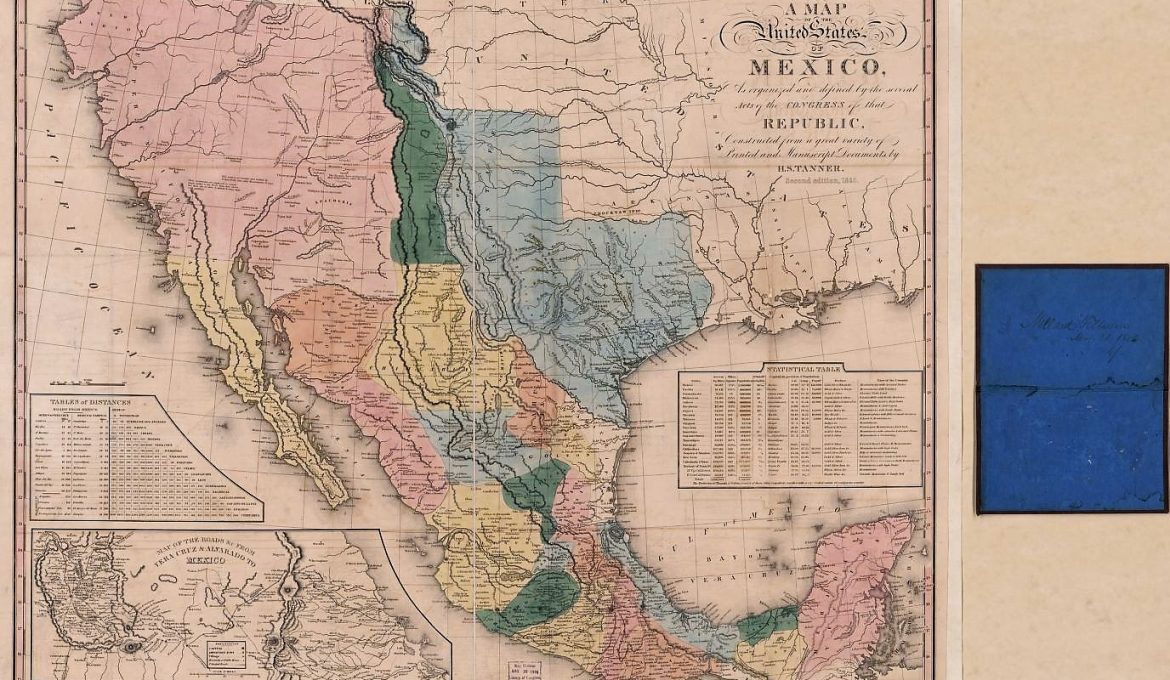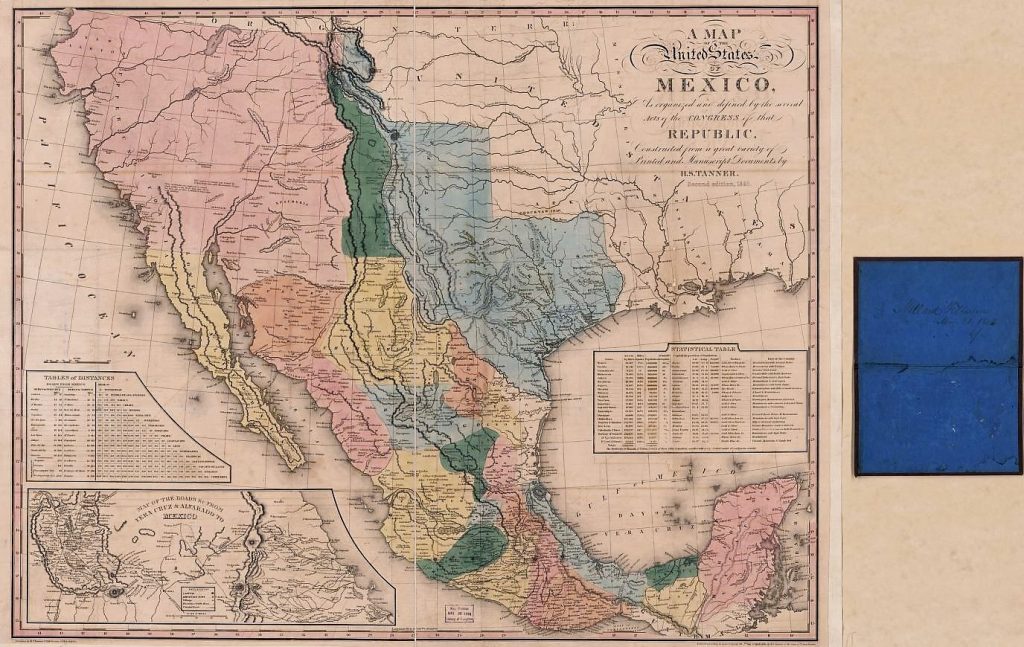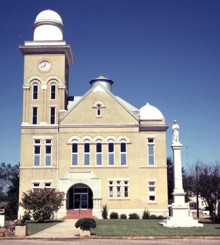ALABAMA IN MEXICO WAR
Letter to
DR. W. S. WYMAN
From
S. F. NUNNELEE
(Written June 14, 1906)
Mexico War Correspondence, Military Records Division Department Archives and History)
Part 4
The next day after the surrender, our Brigade was ordered to prepare for a march to Alvarado, a town of some size down the coast, 60 miles South East from Vera Cruz. I believe this was one of the hardest marches of the war, for it was along the water’s edge, (except about 3 miles) the whole way. The blazing heat, the deep sand, the reflection from the water, and the scarcity of drinking water, made it almost unbearable. We left our Gap position early in the morning, and took up the line of march, outside of the walls, of the city, which were surrounded by pits with iron spikes in the center, making it impossible almost take the city (by apart?).
We camped the first night at the mouth of a little stream 8 or 9 miles, from the City, not far from San Lazardo, where our vessels concentrated a few weeks before. Next morning we resumed our march, striking across a prairie of some extent, with the (a) “Green Pond” near the centre. The water was not brackish, except from the droppings of cattle, it being seemingly their watering place. We charged into it, capturing two small alligators; Proceeding, we camped on the coast, sinking wells in the sand for our next day’s water supply, getting some from a pond further west one or two miles.
We detailed a water squad to slip quietly to our wells about midnight, to fill our Canteens. The hour came, and the rattle of the canteens was equal to a charge of cavalry. The water was brackish, but far better than none.
Our line of March was along the water’s edge, and many of the men’s feet were So Swollen and sore from wading in the water, they had to be put in wagons.
About two o’clock we came to a jutting sand cliff, with cold water dripping. It was effecting to see men stand in the water with heads thrown back, their mouths open, tongues out, catching a few drop of water as it fell into the surf.
We reached the town about 2 or 3 miles up the river, in the dusk of the evening. It had surrendered to a naval commander the day before. It was a beautiful town, with a beautiful River front, flowing through mountain gorges above. We could see the smoke of the Mexican camp fires, they having left before we arrived.
We remained there two nights, demolishing some forts, and of course more chicken roosts suffered. I saw a drunken Sailor charge several times through a cactus hedge. In trying to arrest him, he made for the river and that only stopped him. If a man gets drunk on Muscal, it is said, he is drunk for a month. We saw some very pretty women in the bared windows and on the Veranders. The old Alcalde was a polite old white head. Saw no soldiers.
Next day, we started on our return march to Vera Cruz, completing our last stage in the night—tired, worn out and glum. This was the first time I ever saw Col. Coffee excited. As he passed along men perpetually plied him with the question, “Colonel, where are we going to camp?” Sticking his heels into his mustang, he replied, “Dinged if I know!”, and we all lay down outside the city gate, to wait for the morning, to get a nap, and let the Regiment catch up. Stragglers were coming in all next day.
We marched through the city, and from the the piles of debris in the streets and holes torn through the walls, we thought of the terrible agony of the people during the Bombardment. We went into camp to recuperate, clean up and wait for orders.
Some of us got permits to go into the city and to visit the castle. Very Cruz is a much larger City than we thought, compactly built, with good streets. Families; live up stairs and in the rear of stores. I cant remember seeing many shanties. The castle is impregnable, being built of coral, on a reef, the walls being impervious to ball and bomb. The Castle proper covers several acres, and there are several hundred cannons, large and small, and some immense iron mortars. It is situated about 1,000 yards from the city warfage,—the chanel between being 60 or 70 feet deep. The dungeons are hideous, with massive doors. I am unable to give a minute description of either castle or city, but it is certainly strongly fortified, but it would be much stronger if it had outer defensive works. The wall around the city being of brick, if I mistake not, if attached from the rear, could soon be demolished with cannons. In a few days orders came for us to take up the line of march toward the city of Mexico via, Jalapa, Pueblo route. Our camping places were those of the army preceding us, About 16 miles out over a dirt road, we camped on a creek, and remained there the next day, hearing the guns of the battle of Cero Gordo. The road from there to Jalapa is a double Pike, well built, over a rolling country, with deep gorges on either side. We camped the 2nd night near the National Bridge over the Rio Frio, a structure of great strength and good workmanship. It has 16 or 18 stone arches. The road approaching the Bridge from the south, winds around the base of an almost perpendicular peak, several hundred feet high, with a small fort and a gun on top, which could only be effective at a distance, for the guns could not be depressed at short range.
On the north west bank Santa Anna had a beautiful, well-furnished Hacienda, and it was sad to view the smahed furniture and magnificent mirrors. Many papers and documents were scattered over the floors. I picked a beautifully written letter written letter & signed by Gizott, the French Minister, which I kept for a long time as a souvenir. This Bridge is only a few miles from the Cero Gordo gorge, the famous battle ground. It is practically impregnable, circular perpendicular wall on the left, and a high rocky cliff on the right, at the head stands the Sugar Loaf, where I counted heaps of dead Mexicans, killed by our troops who attacked from the rear. I suppose the gorge is something like a mile long, where the dry strain turns to the right, (going) up) where our men scaled the steep ascent to the rear of the Sugar loaf,
In going up I and a few companions, after viewing the supposed mortally wounded General Shields, turned to the left and passed up on the south side; and we soon wished we had remained with the column, as we walked into a nest of five or six living Mexican solders with arms, and a number of woman, whom I suppose were caring for the wounded, and the bodies of the dead. We jabbered friendly excuses, and let off with a few snarling frowns. We were glad to get away with no worse demonstration, as our guns were unloaded. We realized we had made a mistake and loitered not until we joined our Regiment as it imerged at the head of the gorge, where we found a poor Mexican soldier chained to a cannon that was pointing down the pass. We felt pity for him, but as he was none of our Mexican, we left him there.
We had not proceeded far, when we met a number of Mexican prisoners, under escort-gallant general Vega among them Santa Anna ought to have crushed our army at this battle, for surely there is no stranger position, naturally, in the whole Republic of Mexico. But then, Americans are accustomed to overcoming or flanking difficulties—and they could have done so by reinforcing Gen. Taylor, and approaching the Capitol via. San Louis Postosi.
We entered the beautiful little city of Jalapa, in the evening, and pitched our camp near a Scotch Cotton factory on the west side of town. The Main army had passed on towards Pueblo, and the term of our enlistment was drawing to a close. Soon a proposition was made us to enlist for the war. We proposed 3 months, or until the City of Mexico was taken, which we thought would, end the war. Uncle Sam was strong enough to reject our compromise, and we began to think of home.
Above I use the term “Beautiful Jalapa,” and I feel that it is fully entitled to it; because of its location and surroundings. It is situated on the western terminus of a long stretch of table land reaching from Cero Gordo to the base of the Orizaba, rolling and interspersed with undulating ridges, with mount views and glimses of the Gulf of Mexico to the north and north west, with the ever present Orizaba in front to the South west; affording every degree of temperature one wish, within a few miles. Just north of the main Street is a high, sugar Peak, affording an extensive view in every direction, with the blue hills and mountains south and southwest beyond the Orizaba towards Pueblo, and the gulf with Ships and sail vessels dotting its surface. Cordova, the famous coffee region, lies to the South east, while oranges, pine apples and other tropical fruits and flowers are cultivated in the gardens, and brought in on the backs of the peons and beasts of burden for miles aroung. There are some beautiful residiences, a splended church, and pretty women. I was on the Loaf, above spoken of, one day, and saw a heavy cloud, with vivid lightning, but on top the sun was shining brightly, when I descend to camp I was astonished to find that a heavy rain had fallen, and the ruts and little rivulets were flooded with rushing water. I have often thought, that with protection to life and property, Jalapa would be an ideal dwelling plaee. You remember that Cordova was the home of Gov. Isham Harris after the war, where he carried $40,000. or $50,000 of Tennessee’s money with him to keep it from the clutches of Uncle Sam’s collectors of “Revenue Only” and turned it over to the state authorities, when it was safe to do so. He was grand old man yet few like him left. I can only think of Senator Morgan and Pettus, when I think of U.S. Senators.
1846 Map of Mexico (Library of Congress)
One Sunday morning I went into the Catholic church “just to see what I could see” you know, Before a picture or image of some sort, I saw a judge Iscariate Kneeling with eyes glaring, hands and arms extended, stripped to the waist, and the perspiration oozing from every pore, standing in beads and joining, running off in tiney rivulets. I looked at him for some time, went up on the “loaf,” and coming down to go to camp. I concluded that I would step in and see what my penitent friend was doing. There he was, in the same posture, the perspiration still oozing, and apparently, had not batted his eyes. I thought to myself, “You are a hard case, old fellow,” and I left with “the peace makers.”
The “boss” of the Factory spoken of, was an intelligent old Scotchman, who had been there 40 years, he told me, and had made lots of .money. He abused Santa Anna roundly for preceding his army to a safe place, taking with him $20,000 of his money he told me. He looked like an old Scotch Presbyterian, and I did not think he lied about it. He told me that his head man was from Georgia, named Hall, and for some offense against the authorities, either church or State, his wife Mrs. Hall hid him in a well, until she could find means to passify his accusers, or get him out of the country,
In a few days we began to pack up to leave for home, I do not remember that any of our boys joined the army. They sent down a wagon load of Mexican soldier uniforms for us to “rig” ourselves out in, if we chose I picked out a coat that would button in front but the front button struck me just below my nipples, and the “swallow tail” struck me just below my back suspender buttons. I declined to play “The camp Fool” in that garb, but proposed to auction off the whole lot, free gratis for Uncle Sam. I did not get a bid.
We struck out for Vera Cruz, and there was little straggling, We made our last march, Starting about 2 A. M. and made all the noise we could, but I actually saw some men walking along fast asleep. It was too much. I think we made the march from Jalapa to Vera Cruz in about two days, or a little over.—I may be mistaken.
Our batallion boarded the Virginai—the same craft, I believe that took us to Tampico from Point Isbell. She was a slow coach, even with sail and steampower. But we were moving towards home. We were becalmed bearly one day. Entering the mouth of the Mississippi a fearful rain and wind storm struck us, and we had to put to sea. But fortunately, we finally landed in New Orleans, took a bath, shaved, cut off our manes and tails, diked ourselves out in new suits threw our lousey clothes away; and took the street having to be introuduced to each other when we met.
A time was set to draw our “Pay rations,” Receiving mine (and my sick brothers) put it in a big red silk handkerchief, I approached Col. Coffee in a whimpering manner, bidding him farewell; seeing tears gathering in the eyes of the dear man, I waived my silk handkerchief in his face, and asked, “Colonel have you drawn your rations yet,” His look of astonishment haunts me yet, at times.
We took passage for Mobile, and arriving on time, spent a day in the City, and took the first boat for Tuskaloosa. She grounded just above Demapolis. We took the road to Forkland. Many of us took supper with Messrs. Williamson Glover, J. I. Thornton, Geo. Perrine and others, and Mounting Mules, horses, etc. at a given signal we “joined the Cavlary,” and reached for Eutaw about 110 clock, just twelve months from the day we left for the army in Mexico; June 2nd, 1846.
A large crowd had assembled at the Court house to bid us welcome, Congratulatory Speeches were made hearty shakin followed. This was the prelude to a public reception and dinner which followed in a few days after our return. We were glad, & friends were not ashamed of our record as men and soldiers.
I have omitted a great deal that might have been stated, but I have been as concise as possible in order to give a mere birds’ eye view of the movements and work of the Regiment, A private soldier hears a great deal, but little, hence there is more personalison in this article that there ought to have been, But what I have written, has not been prompted by a spirit of Vanity, but really to help me kill the hot weather and possibly amuse you. There has been very little said of the services of the only Regiment sent to the Mexican war from Alabama, but the one or two Battallions have been oftener mentioned. Our service was very trying one, for it was evident from its first organization that it would probably see but little active service. I think, however, that the Regiment been called into battle, it would not have been much if any behind in valor of the foremost Volunteer Regiments. There was much first class material in it, and had it been properly finished up, it would have taken rank with the foremost soldiers in a war that brought so much fame and wealth and territory to our country.
Cowan, Tenn. ) S. F. Nunnelee
June 14th. 1906
Where Do I Start?: HINTS and TIPS for BEGINNING GENEALOGISTS with ONLINE RESOURCE
Do you need some guidance in your genealogy search? Save time and avoid pitfalls in your research. This book provides simple, no-nonsense instructions to help you get started. Many FREE research links included. Where Do I Start is filled with Hints and Tips to begin your family genealogy research and acquire Genealogy information.
Where Do I Start?: HINTS and TIPS for BEGINNING GENEALOGISTS with ONLINE RESOURCE






